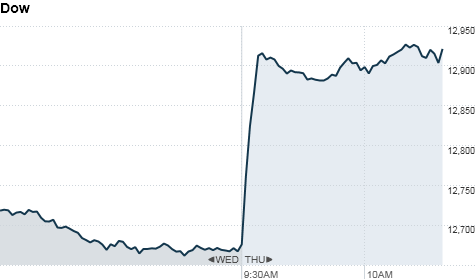NEW YORK (CNNMoney) -- If the so-called fiscal cliff takes effect in 2013, the U.S. deficit outlook will improve, but scheduled tax increases and spending cuts would push the country into recession and unemployment up to 9%.
That's one of the main takeaways from an analysis Wednesday by the Congressional Budget Office, which released its updated budget and economic projections for 2012 through 2022.
The fiscal cliff is made up of an enormous amount of tax hikes and spending cuts set to take effect starting in 2013.
Among them, the expiration of the Bush tax cuts and the enactment of $1 trillion in automatic, across the board spending cuts that are being triggered because Congress has failed to come up with an alternativedebt-reduction plan.
If all the policies are allowed to go into effect, the CBO projects that the economy, as measured by GDP, will shrink by 0.5% between the fourth quarter of this year and the fourth quarter of next year. Unemployment, currently 8.3%, will rise to 9% in the second half of 2013.
The CBO's forecast for 2013 has worsened since May, when it first forecast the fiscal cliff would cause a recession.
The fiscal cliff would, however, improve the deficit picture greatly. The CBO forecasts the deficit will hit $1.1 trillion this year -- or 7.3% of GDP. But for 2013, it would fall to $641 billion, or 4% of GDP under the fiscal cliff. That would represent the biggest single year drop in the annual deficit as a percent of the economy since 1969.
Looking ahead to the rest of the decade, the CBO projects deficits wouldcontinue to fall dramatically through 2018 before starting to rise again as the costs of supporting an aging population start to take hold. Net result: the debt held by the public would fall to 58.5% of GDP by 2022, from a projected 73% this year.
By contrast, if lawmakers did not allow the fiscal cliff to take effect, the economy would continue to grow, albeit at a slow 1.7% pace. It would also create 2 million more jobs than if fiscal cliff policies were enacted, leaving the unemployment rate at 8%.
While that would result in a better economy in the short-term, over the next decade, the debt picture would worsen considerably and weigh on the economy in the later years.
In the absence of the fiscal cliff, the CBO forecasts the deficit in 2013 would again hit $1 trillion. And by the end of the decade, debt held by the public would rise to 90% of GDP, the highest it has been since shortly after World War II.
If lawmakers choose not to reduce deficits next year in order to preserve the economic recovery, they'll need to do so eventually, said CBO director Douglas Elmendorf.
"The key issue [for policymakers] is not whether to reduce budget deficits. The question is when and the question is how," Elmendorf noted.
At the moment, it's not at all clear how Congress will handle the fiscal cliff. Neither party wants all of the scheduled policies to take effect, but in the midst of a bruising campaign season, neither is willing to budge on their partisan views regarding how to replace the cliff.
